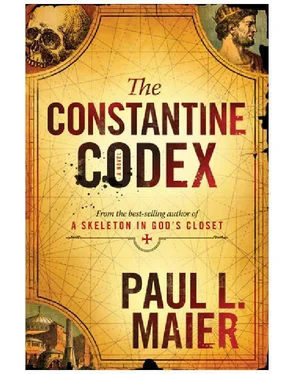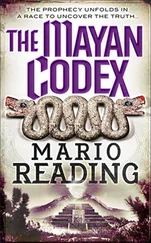Paul Maier - The Constantine Codex
Здесь есть возможность читать онлайн «Paul Maier - The Constantine Codex» весь текст электронной книги совершенно бесплатно (целиком полную версию без сокращений). В некоторых случаях можно слушать аудио, скачать через торрент в формате fb2 и присутствует краткое содержание. Жанр: Триллер, на английском языке. Описание произведения, (предисловие) а так же отзывы посетителей доступны на портале библиотеки ЛибКат.
- Название:The Constantine Codex
- Автор:
- Жанр:
- Год:неизвестен
- ISBN:нет данных
- Рейтинг книги:5 / 5. Голосов: 1
-
Избранное:Добавить в избранное
- Отзывы:
-
Ваша оценка:
- 100
- 1
- 2
- 3
- 4
- 5
The Constantine Codex: краткое содержание, описание и аннотация
Предлагаем к чтению аннотацию, описание, краткое содержание или предисловие (зависит от того, что написал сам автор книги «The Constantine Codex»). Если вы не нашли необходимую информацию о книге — напишите в комментариях, мы постараемся отыскать её.
The Constantine Codex — читать онлайн бесплатно полную книгу (весь текст) целиком
Ниже представлен текст книги, разбитый по страницам. Система сохранения места последней прочитанной страницы, позволяет с удобством читать онлайн бесплатно книгу «The Constantine Codex», без необходимости каждый раз заново искать на чём Вы остановились. Поставьте закладку, и сможете в любой момент перейти на страницу, на которой закончили чтение.
Интервал:
Закладка:
“Well, for a while, it seemed as though it might,” Shannon joined in. “When this great city fell in 1453, Islamic hordes poured into the Balkans, conquering everything up to Vienna, where they were turned back by a Christian Europe that could now finally defend itself. What if there had been no Constantinople?”
Bartholomew had been nodding his concurrence. “Eastern Islamic forces would have joined with their Western forces and European Christianity would probably have been vanquished-as it has been wherever Muslims have conquered.”
Shannon added, “I have little patience with some of our bleeding hearts who point to the church’s great ‘sin’ in the case of the Crusades. That’s a myopia that sees only halfway into the past. If we ever ask ‘Who took more from whom-Islam or Christianity?’ there’s no contest. Christianity has taken not one square foot of territory from Islam that it did not originally possess, whereas Islam has taken Asia Minor, Syria, Lebanon, Egypt, all of North Africa, and part of the Balkans from Christianity.”
“How very, very true, Madame Weber. I wish all Christians were as well informed. So often they can see back only to the Crusades.”
Jon saw his opening and plunged in. “And the losses to Christianity have been staggering, particularly here in Constantinople. Think of the precious church documents that were destroyed here-some probably from the time of Constantine or even earlier. By the way, wasn’t Constantine buried here?”
“Oh yes, indeed,” Bartholomew replied. “He was buried in the Hagioi Apostoloi, the Church of the Holy Apostles. He built the church and wanted to gather relics of all twelve apostles for the sanctuary, but he got only St. Andrew. Well, also the bones of St. Luke and St. Timothy. So yes, Constantine and his sons were buried here, and so were Justinian and Theodora and their family, as well as many of the Byzantine emperors and my patriarch predecessors-St. John Chrysostom, too. That wonderful basilica was second in importance only to Hagia Sophia itself.”
“Is it still standing?” Shannon asked.
Bartholomew shook his head sadly. “The Holy Apostles was rebuilt by Justinian in the year 550, just after Hagia Sophia, and it stood nine hundred more years until the Ottomans conquered Constantinople. That’s when the conqueror, Sultan Mehmed II, turned Hagia Sophia into a mosque and moved our patriarchate into the Holy Apostles. But when that church got surrounded by Turkish settlers who were hostile to Christians, Mehmed demolished the church and built the Fatih Camii on the site, the Mosque of the Conqueror. In fact, he’s buried there. And that mosque still stands, almost in the center of the Old City.”
“Where did the patriarchate relocate?” Jon inquired.
“To the Church of St. Mary Pammakaristos in the Christian district-and eventually, of course, to this place.”
“What happened to the treasures of the Church of the Holy Apostles-its icons, sculptures, sacred books, manuscripts, and-”
“The Venetians,” the patriarch muttered darkly, then, more distinctly. “What history calls the Fourth Crusade-although it was conceived and born in hell-invaded Constantinople instead of the Holy Land in 1204 and plundered the city. The Venetians even looted the Church of the Twelve Apostles, opening the tombs of the emperors-even the sepulchre of Justinian-and carting off their silver, gold, and jewels!”
Bartholomew had visibly changed. Gone was the genial patriarch. In his place was a scowling prophet with flushed countenance who had again wrapped his hand, or rather fist, around the knob of his staff as if to cudgel Venetians off the pages of history. “You know of the Emperor Heraclius?” he asked.
“Byzantine emperor soon after Justinian?” Shannon suggested. “Lived in Muhammad’s time?”
“Yes, exactly, Madame Weber. The Venetians broke open his tomb and stole the golden crown right off his head-with some of his hairs still attached to it! You can see it yet today at St. Mark’s basilica in Venice.”
The disaster at the beginning of the thirteenth century seemed to impinge even into Jon’s twenty-first. His hopes of finding any written materials from the time of Constantine seemed to vanish with the Venetians. Almost timidly, he asked, “What about the other treasures at the Church of the Apostles-the library, the codices, the manuscripts? The Venetians carted those off also?”
Bartholomew thought for several moments, each of which seemed an endless span of time to Jon. Finally the patriarch shook his head. “No, those barbarians, those putrid pirates, couldn’t even read. They wanted gold, not books.”
Jon tried not to look too elated. Swimming in relief-at least preliminary relief-he asked, “What… whatever happened to the written materials? Did the Turks destroy them?”
“Some were lost in the fires that burned at various parts of Constantinople after the conquest, but the church saved a goodly number of important documents.”
“And… where are they now?”
“Some are at church and seminary libraries of the Orthodox churches across the world-St. Vladimir’s in New York, St. Catherine’s at Mount Sinai, Mount Athos-but many are here in the patriarchate.”
Glorious news! Now was the time for Jon to bare his heart. How abrupt should he be? A bald, frontal assault with an unvarnished confession of what he and Shannon ultimately desired? A series of gradual insinuations and hints? No, plain honesty would be best, he decided.
“Your All Holiness,” Jon began, “I wonder if you’d be generous enough to let us see some of the written materials-the documents, the older manuscripts?”
The patriarch seemed somewhat puzzled, hesitant.
“Well, certainly not today,” Jon quickly added, almost in panic. “But perhaps before we leave Istanbul?”
Bartholomew finally nodded. “I only wonder why we have not talked more about the matter that concerns me most, concerns the church most, which is-”
“The debate, of course?” Jon broke in.
“Yes, the debate, Professor Weber. I am to be joint moderator with Mustafa Selim. Don’t you think we should talk more about the debate?”
“Yes, certainly. This must indeed be our central concern. How well do you know Mustafa Selim?”
“Well, we are not the closest of friends, obviously, but we do respect one another. Each time Christians are attacked somewhere in Turkey, he publicly deplores it and tries to build tolerance among the more fanatic elements in Islam. Several times when our patriarchate was bombed, he even sent workers over to help in the repair. A good man. But now, Professor and Mrs. Weber, please to join me for lunch so that we can plan together at table.”
Both the patriarch and Jon had checklists for items related to the debate. Jon was most concerned for the safety of the Christians inside Hagia Sophia and whether there were really enough in Istanbul to constitute half the audience. To his surprise, the patriarch said they could have filled the entire structure with Christians, since many were coming to Istanbul for the event from Asiatic Turkey. He also reported that he and Mustafa Selim were in charge of ticket distribution, and the latter passed them out only to known, moderate Muslims. And yes, the police would be able to assure the safety of those inside.
For his part, Bartholomew wanted to know the main thrust of Jon’s opening remarks and the strategy that he planned to pursue. In response, Jon unpacked his arsenal of Christian arguments as well as the principal points in Islam that he felt were open to challenge. The patriarch’s repeated noddings in affirmation were a welcome sight for Jon, but his concluding caution was quite sobering. “You must walk a very careful line, Professor Weber. If you triumph in the debate-or, I should say, when you triumph-please do so gently. Were you to mortify your opponent, there could be ‘blood in the streets,’ as you Americans put it. On the other hand, our faith must be defended with vigor, for it is God’s own truth. The way will be narrow-and difficult.”
Читать дальшеИнтервал:
Закладка:
Похожие книги на «The Constantine Codex»
Представляем Вашему вниманию похожие книги на «The Constantine Codex» списком для выбора. Мы отобрали схожую по названию и смыслу литературу в надежде предоставить читателям больше вариантов отыскать новые, интересные, ещё непрочитанные произведения.
Обсуждение, отзывы о книге «The Constantine Codex» и просто собственные мнения читателей. Оставьте ваши комментарии, напишите, что Вы думаете о произведении, его смысле или главных героях. Укажите что конкретно понравилось, а что нет, и почему Вы так считаете.












